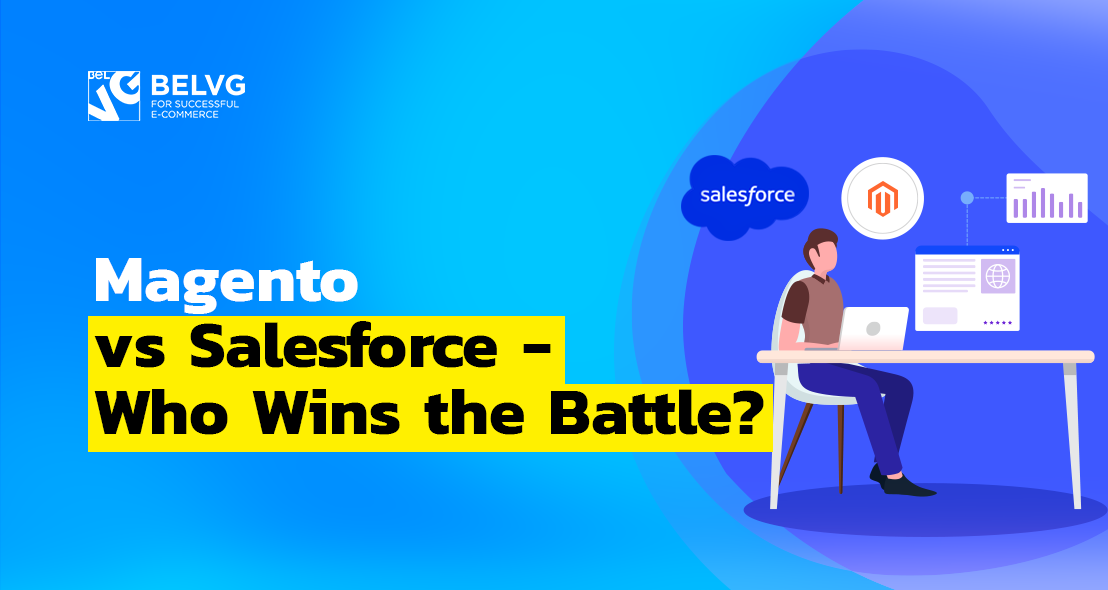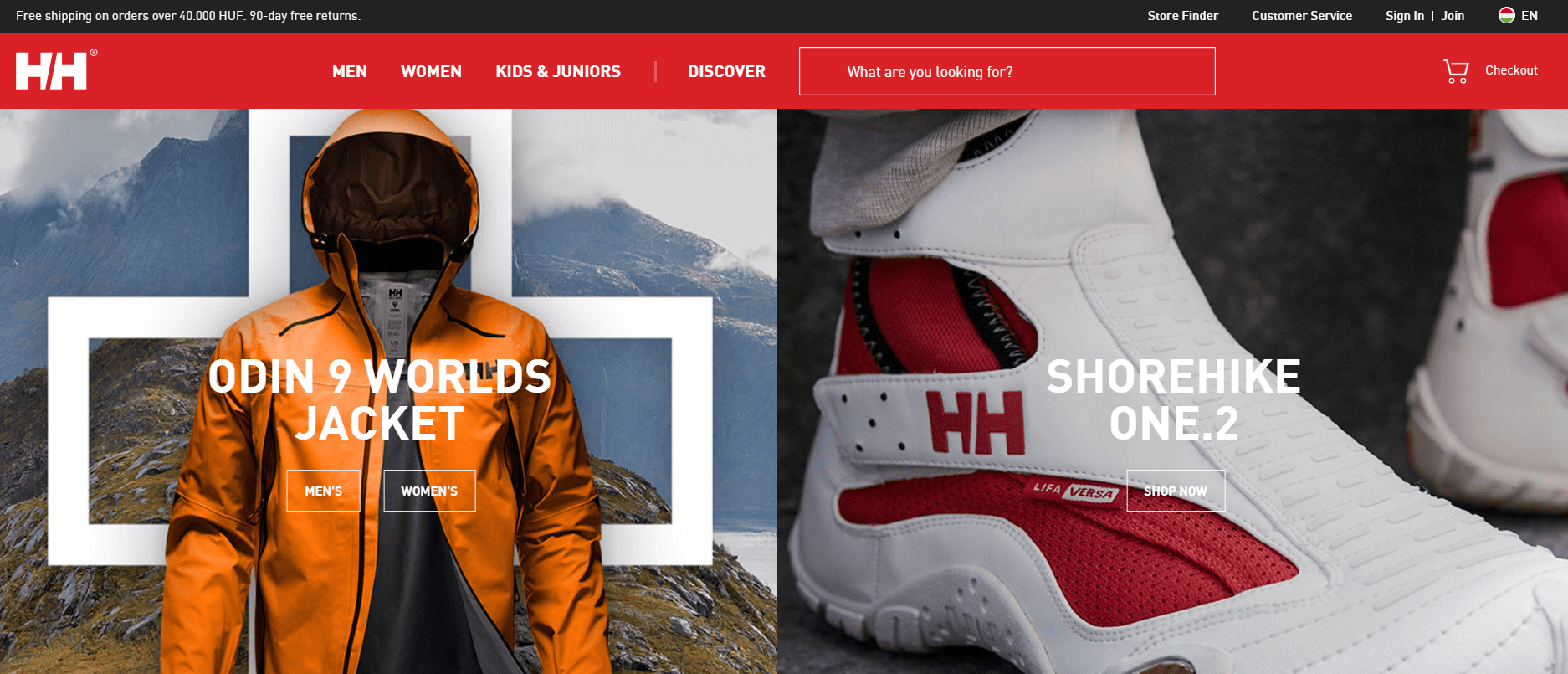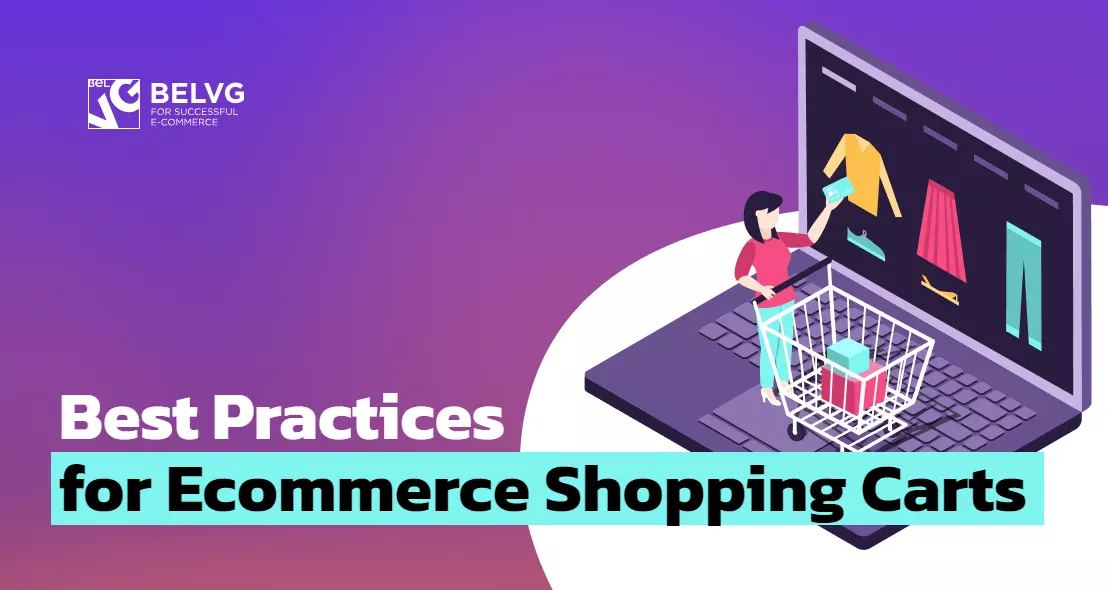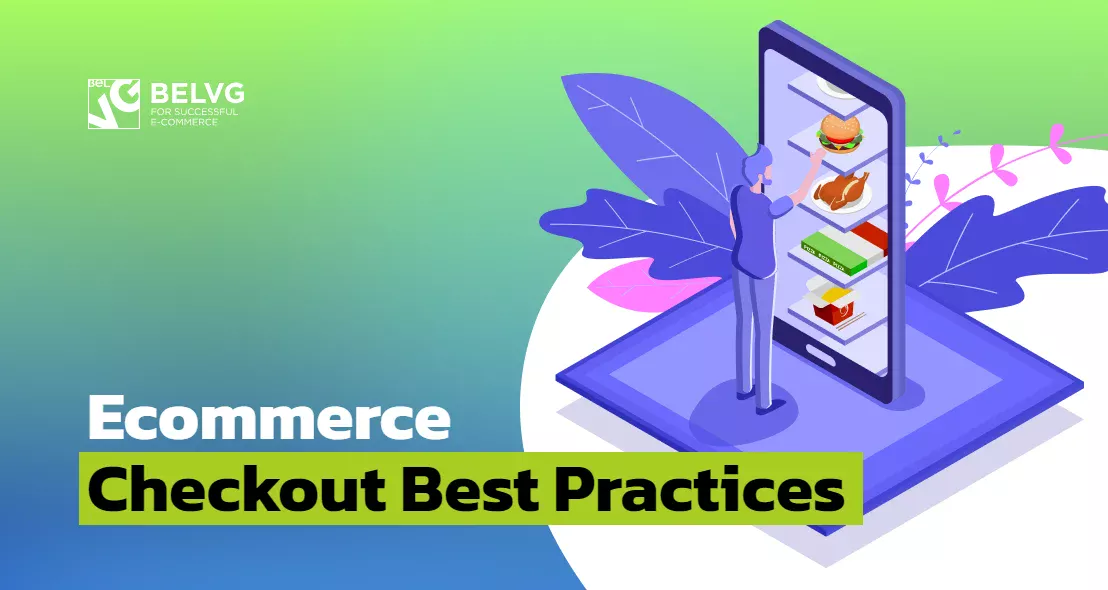
Whether you are a large, middle or small retailer, you have probably heard about such ecommerce platforms with a global reputation as Magento and Salesforce. But which of the two is the best? You will find the answer in this article.
Magento and Salesforce (previously Demandware) can be rightfully named as two leading ecommerce platforms, chosen by thousands of small, medium and large retailers to conduct their business online. Despite being so widely-used, they differ critically from each other – in the technology stack, in back office capabilities and pricing. In addition to this, Magento and Salesforce offer unique approaches to running online stores and have their pros and cons. If you hesitate between these two solutions or just want to know how in which aspects they are different and alike, this article is for you.
Below you will find a detailed description and multi-faceted comparison of Salesforce vs Magento. This article will address the following aspects:
Table of contents
Magento and Salesforce: an overview
Hosting
Merchandising capabilities
Multi-currency and multi-language
Content management
Native platform support
Customization
Pricing
Magento and Salesforce: an overview
Before we begin to compare these two ecommerce platforms, let us have a brief overview of what Magento and Salesforce are.
What is Magento software
Magento is a comprehensive e commerce platform and CMS, popular with retailers around the world. Magento was created in 2008 by the US private company and changed many owners; since 2018 it belongs to Adobe. It was written in PHP and functions as an open source solution. Magento stack is unparalleled, incorporating many powerful technologies like Apache, Nginx, MySQL, jQuery, Symfony, Varnish and so on.
After the rebranding in 2017, Magento offers two versions of the platform: Magento Open Source and Magento Commerce. The Open Source version is free and provides a solid package of basic ecommerce functionalities. Magento Commerce is the paid version, with the robust out-of-the-box functionality, enforced security and technical support. In this article, we will mostly use the Magento Commerce version for comparison. You can learn more about the Magento versions distinctions in our article that explores Magento versions in great detail.
Brands who trust Magento
Nothing confirms the excellent reputation of the ecommerce platform better than globally recognized brands that trust it. This is the list of large companies who chose to run their online stores with Magento:
Helly Hansen
Wrangler
Hermes
Ferrari
Nike
Ahmad Tea
Agent Provocateur
Lee
JCB
What is Salesforce Commerce Cloud
Salesforce Commerce Cloud is a cloud-based Software-as-a-Service (SaaS) solution and ecommerce platform. Previously named Demandware, it was acquired by Salesforce in 2016 and had its name changed to Salesforce Commerce Cloud. SaaS basis means that the software is licensed on subscription and businesses pay for using the platform, but never get to own the tool they use.
Salesforce Commerce Cloud is built on Java, with its source code closed to the third-parties. Instead, the program code is available only via its REST API and the platform’s own Pipelet system, which means that additional functionalities can not be added directly in Java. The platform uses a specialized Eclipse plugin to simplify the process of uploading code to the server.
Brands who trust Salesforce / Demandware
This is the list of brands who trust Salesforce Commerce Cloud to run their ecommerce with.
Acne Studios
Ugg
Lacoste
GAP
L’Oreal
New Balance
Clarins
Adidas
Columbia
Fila
Magento vs Salesforce: Hosting
Hosting is the most critical Magento and Salesforce distinguishing feature in the aspect of technology. The developers of both platforms initially selected fundamentally different approaches to how their solutions would be hosted. As a result, Magento became a non-cloud and on-premise ecommerce platform, while Salesforce was developed as a cloud, Software-as-a-Service online retail solution.
Magento hosting
Magento Commerce is self-hosted, which requires from the business owner to purchase and set up the hosting solution on their own. On the one hand, the entrepreneur can consciously select the hosting plan that suits them in price and functions, while an on-premise location allows to customize the online store in a scale much greater than a SaaS solution. Moreover, Magento is easier integrated with third-party solutions like tax, shipping and payment system. On the other hand, self-hosting obliges the business owner to take responsibility for the platform maintenance and upgrades, and either employ an in-house team or turn to Magento hosting partners for assistance in this matter.
Since the days of its initial launch, Magento has always been an on-premise ecommerce tool. The things changed in 2016, when Magento launched Magento Enterprise Cloud Edition, positioned as a Platform-as-a-Service (PaaS) solution. The developers decided to run this new version on Amazon Web Services (AWS), since it is the most popular hosting solution among their clients. The “first-of-its-kind in-market solution and a major differentiator in the broader Magento product portfolio”, according to Mark Lavelle, CEO of Magento Commerce, Enterprise Cloud promised improved and flexible ecommerce experience: simplified integration with third-party systems, scalable Web storefronts and enhanced infrastructure. However, the Magento Enterprise Cloud Edition initially received mixed reviews due to several issues its first users faced and still has not gained a solid reputation and popularity, unlike the rest of Magento on-premise versions.

Magento Development Services
Take your online store to the next level with BelVG Magento development
Visit the pageSalesforce hosting
Salesforce Commerce Cloud is a cloud-based SaaS ecommerce solution. The main advantage of such hosting provisions is that maintenance, management, upgrades, SLA and all kinds of associated services and guarantees are provided for by Salesforce. Although such solutions naturally come at a higher price, the retailers who do not want to bother with constant in-house maintenance, security and updates provisions are willing to pay for that.
The SaaS model is more rigid in terms of customization, which is a significant disadvantage of Salesforce Commerce Cloud. Since Salesforce is served to a wide range of businesses, the providers put a focus on security and meeting SLA instead of making it flexible for potential sophisticated customization. Therefore, there is a limit to the features one can implement and configure in Salesforce, as well as an obligatory approval procedure for new modules you want to install or code you want to alter. These necessary measures may slow down your progress, deferring releases and changes.
Scalability has always been positioned as the main competitive advantage of Salesforce Commerce Cloud – in comparison to Magento and other same-level e-commerce solutions. Although the Salesforce developers indeed put a lot of effort in ensuring scalability, Magento’s freedom of customization also allows to scale it to an enterprise-level infrastructure. The Magento-based Shiekh Shoes webstore, a large footwear retailer from the USA, is proof of that.
Merchandising capabilities
First and foremost, ecommerce platforms serve to sell products online, which means that the businesses will pay close attention to their merchandising capabilities. Being the leading ecommerce solutions on the market, Salesforce and Magento are both heavily equipped with product, order and inventory management functionalities.
Magento product management
Merchandising is considered Magento’s strong area, with the following key features available at the Open Source and Community versions alike.
- Six product types, including digital, downloadable, gift cards and bundle products, each with their own abilities and scope of use.
- In-build visual merchandising.
- Ability to group clients into customer groups in order to assign different levels of logic to them.
- Cross-sells, up-sells and related products offers.
- Default PayPal integration and capability to freely integrate third-party payment gateways.
- Guest checkout.
- Multiple store management from a single admin panel.
- Setting up different promotion types (via gift cards, catalog and cart price rules, shipping and so on).
- Creating loyalty and rewards programs and setting up private and flash sales.
Bear in mind that this ample stack of merchandise capabilities can be easily extended with native or third-party Magento extensions.
Salesforce product management
Salesforce also stands out with its solid stack of merchandising capabilities that include the following features:
- Simple and complex product types.
- Sophisticated visual merchandising.
- Rule-defined and automated cross-sells, up-sells and product recommendations.
- Customer segmentation capabilities.
- Ability to set up different kinds of promotions (based on shipping method, order or product).
- Multiple catalog functionality.
- Strong native search.
Please note that the mentioned above capabilities are best applied to B2C commerce. Since B2B retail is not a point of focus for Salesforce, these functions may not perform at the same level in this type of online stores.
Multi-currency and multi-language
With global markets posing as a great source of profit and brand recognition, multi-currency & multi-language capabilities became indispensable in a modern ecommerce platform.
Magento multi-currency & multi-language
Magento’s advanced multi-store functionality is complemented with capabilities that facilitate global trade like multi-currency and multi-language. An admin can easily configure Magento multi currency settings in the back office as well as set up any of the world languages, different for each store view. Moreover, Magento open source architecture allows to set and update the currency or language configurations programmatically.
Salesforce multi-currency & multi-language
Compared to Magento configurations for global commerce, Salesforce multi currency and multi language functions are more sophisticated. Salesforce Commerce Cloud allows to set up additional costs for territories of your choice as well as configure product data, availability and description based on the region.

Magento Development Services
Take your online store to the next level with BelVG Magento development
Visit the pageContent management
Each product page contains a lot of information, valuable for attracting customers as well as promotion. This makes content management feature a must for such leading ecommerce platforms as Magento and Salesforce.
Magento content management
Recently, Magento natively integrated the Page Builder, which instantly upgraded the platform’s content management capabilities. A page builder is an intuitive drag-and-drop tool for creating and editing of CMS pages, static and dynamic blocks. This functionality allows to not only configure the design of static elements, but also alter the behaviour of the dynamic page elements.
Learn more about page builder in Magento and how to work with it from our article What is Page Builder in Magento 2? How to install it?.
Salesforce content management
Content management has always been a weak spot for Salesforce. Historically, it contained no in-built functionality to cover for organizing and managing pages with content, so those store owners who needed such capabilities implemented them via extensions. The company itself understands the gap in content management functionality, therefore they recently have announced the introduction of a page builder tool similar to the Magento one. At the moment, Salesforce content management system is at the development stage.
Native platform support
Breakdowns and critical bugs occur unexpectedly and cost so much to your business, that the support plan is among the top-priority factors determining whether or not to opt for the platform.
Magento support
Magento provides an on-demand, or application support, and only for the Commerce version. As a store owner, you can choose to settle for these arrangements or turn to a Magento agency for professional support.
Salesforce support
Compared to its opponent, ex Demandware support offers a much reliable and comprehensive plan that includes around-the-clock support, load balancing, assistance during sales peaks, etc.
Customization: Magento vs Salesforce
Before we discussed the native Magento and Salesforce features; now it is time to address the customization capacities of each platform. Since it is impossible to provide for the needs and requirements of every ecommerce platform user, the ease of customization, both programmatically and with extensions, is a significant competitive advantage.
In a nutshell, it will be fair to say Magento and Salesforce are wonderfully extendable ecommerce solution. Firstly, both platforms stand out among competing online retail solutions with comprehensive developer documentation and APIs. Secondly, if you do not possess sufficient level of developer expertise to make alterations programmatically or just short of time and resources, you can always visit Magento and Salesforce official marketplaces (https://marketplace.magento.com/ and https://appexchange.salesforce.com/). There you will find native and third-party extensions, free or paid and corresponding to any functionality your store is missing. Both marketplaces carefully review the source code of each submitted extension before putting it up for sale at their marketplace.
However, Magento has a visibly larger number of extensions and themes than Salesforce developer marketplace, which can be explained by the fact that the latter has a smaller developer community. Therefore, due to a higher level of extension competition, Magento Commerce extensions and designs cost less than Salesforce’s on the average.
Pricing of Magento Commerce and Salesforce Commerce Cloud
Budgetary limitations are very hard to omit and overcome for enterprises of all scales, but especially for small businesses and startups. Therefore, the cost is the last but not least factor that determines the choice of the future ecommerce solution.
Magento ecommerce price
Magento offers two versions: Magento Open Source and Magento Commerce. The first one is free and open source, which means you can download it from the official website and configure the way you want; if you choose Magento Open Source, the pricing will depend solely on the cost of additional extensions and integrations, if you decide to purchase any.
Magento Commerce, on the other hand, is a paid version. The yearly Magento license costs start from $23,000 per year; since Magento now works to GMV brackets, the final licensing cost will depend on the scale of your business. In addition to the platform purchase, you may require further Magento website build or development services, which range from $150k to $1m, depending on the amount of work and its complexity as well as the agency location and its reputation on the market.
Salesforce pricing
Salesforce Commerce Cloud also works according to the GMV model, with costs depending on the size of the enterprise and its turnover. Because it is charged by quote and each case is individual, it is impossible to provide the exact answer to the question “How much does Salesforce cost”, yet by approximate estimation, a retailer with a $20m turnover will be charged with around $300k – $750k. Still, we advise not to rely on rough estimation and inquire about Salesforce prices individually.
Conclusion
We sincerely hope that the features and cost comparison will help you make the decision on whether to implement Magento Commerce or Salesforce Commerce Cloud for your online store. In the end, there is no right or wrong ecommerce solution, and choice between platforms roots on your budget and financial limitations, the industry you work in, specifics of your business, your goals and priorities.
The major distinction between Magento Commerce or Salesforce Commerce Cloud is the way they are hosted, which defines the scope of customization freedom. If you aim your business to grow and expand and you want to experiment with the solutions you apply to it, then Magento is your number one choice. Yet, if you are satisfied with the out-of-the-box features and value stability and security, then you’d better run your webstore with Salesforce.
Pricing is another core difference between Salesforce Commerce Cloud and Magento Commerce. On average, the first platform costs more, yet it comes with 24/7 support and in-built hosting. Magento, on the other hand, costs less, yet requires additional development and support works. Therefore, if your budget allows you to pay a third-party agency for continuous support and occasional development services, or even employ an in-house developers team, then choose Magento. In case you do not mind paying more initially in order not to worry about with additional expenses and security breaches, then opt for Salesforce Commerce Cloud.
Good luck with making your choice about the ecommerce platform for your business! If you have any questions or comments, feel free to leave them below.
Want to migrate to Magento 2? Turn to BelVG ecommerce development agency and we will assist your online store migration from any third-party online retail solution.

Magento Development Services
Take your online store to the next level with BelVG Magento development
Visit the page
























